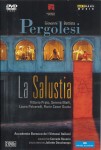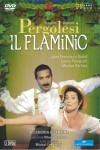Pergolesi - La Salustia
Vittorio Prato; Serena Malfi; Laura Polverelli; Accademia Barocca De I Musici Italiani; Corrado Rovaris
ArtHaus Musik 101651
Pergolesi - L’Olimpiade
Raúl Giménez; Lyubov Petrova; Yetzabel Arias Fernández; Academia Montis Regalis; Alessandro De Marchi
ArtHaus Musik 101650
Pergolesi - Il Flaminio
Juan Francisco Gatell; Laura Polverelli; Marina De Liso; Accademia Bizantina Orchestra & Chorus; Ottavio Dantone
ArtHaus Musik 101653
Of Pergolesi's operas only the intermezzo La Serva Padrona is now at all well known, although I once saw another intermezzo, Livietta e Trascollo. But in his short life (he died at the age of 26), Pergolesi wrote a number of full-length operas, both serious and comic. The opera house in Jesi, Pergolesi's birthplace, has performed several of them in recent years.
 Of the three recordings under review, that of La Salustia is the least satisfactory. The opera is set during the reign of the third-century Roman Emperor Alexander Severus and presents the rivalry between his mother and his wife. The best performance comes from Serena Malfi as the emperor's much abused wife but all of the singers are technically very competent. The main drawback is the acting which is either rudimentary or grossly exaggerated. Attempts at baroque gesture are unsuccessful. I also thought it was a mistake to cast a countertenor as the emperor. I am not saying this because I disapprove of the use of countertenors in 18th century opera (unhistorical though it is). A singer with a stronger voice like Philippe Jaroussky would certainly have managed it very well.
Of the three recordings under review, that of La Salustia is the least satisfactory. The opera is set during the reign of the third-century Roman Emperor Alexander Severus and presents the rivalry between his mother and his wife. The best performance comes from Serena Malfi as the emperor's much abused wife but all of the singers are technically very competent. The main drawback is the acting which is either rudimentary or grossly exaggerated. Attempts at baroque gesture are unsuccessful. I also thought it was a mistake to cast a countertenor as the emperor. I am not saying this because I disapprove of the use of countertenors in 18th century opera (unhistorical though it is). A singer with a stronger voice like Philippe Jaroussky would certainly have managed it very well.
 The libretto for L'Olimpiade is by Pietro Metastasio. It was set by dozens of composers, beginning with Caldara in 1733. There is a CD set issued by Naïve which uses the complete text of the Metastasio arias but uses music by 12 different composers (it was reviewed in the July 2012 issue of The WholeNote). Pergolesi's version dates from 1735 and was written for Rome. It features a tenor, a baritone and four singers with high voices. Since women were not allowed on the stage in Rome, the higher parts would have been performed by castrati. Here they are sung by women, a sensible decision, and the singers are very good indeed, particularly Sofia Soloviy and Jennifer Rivera, in trouser roles. I am not wild about the production which makes no attempt at creating any theatrical illusion and does nothing with the important pastoral element of the work.
The libretto for L'Olimpiade is by Pietro Metastasio. It was set by dozens of composers, beginning with Caldara in 1733. There is a CD set issued by Naïve which uses the complete text of the Metastasio arias but uses music by 12 different composers (it was reviewed in the July 2012 issue of The WholeNote). Pergolesi's version dates from 1735 and was written for Rome. It features a tenor, a baritone and four singers with high voices. Since women were not allowed on the stage in Rome, the higher parts would have been performed by castrati. Here they are sung by women, a sensible decision, and the singers are very good indeed, particularly Sofia Soloviy and Jennifer Rivera, in trouser roles. I am not wild about the production which makes no attempt at creating any theatrical illusion and does nothing with the important pastoral element of the work.
 While the two operas discussed above are opere serie, Il Flaminio is a comedy or, as it was known in Neapolitan dialect, a commedia pre musica. It incorporates popular melodies as well as jokes about language. The maid Checca is from Pisa, she makes fun of the Neapolitan dialect spoken by her boyfriend and complains that he mispronounces her name as Cecca. He then attempts, unsuccessfully, to address her in Tuscan. The production does not start well: the baritone overacts and the tenor is not much better but the women are excellent. Laura Polverelli gives a magnificent performance of an opera seria aria in Act I (it is the context which makes it a parody) and there is a delightful impersonation by, again, Serena Malfi as a gauche but ultimately successful suitor.
While the two operas discussed above are opere serie, Il Flaminio is a comedy or, as it was known in Neapolitan dialect, a commedia pre musica. It incorporates popular melodies as well as jokes about language. The maid Checca is from Pisa, she makes fun of the Neapolitan dialect spoken by her boyfriend and complains that he mispronounces her name as Cecca. He then attempts, unsuccessfully, to address her in Tuscan. The production does not start well: the baritone overacts and the tenor is not much better but the women are excellent. Laura Polverelli gives a magnificent performance of an opera seria aria in Act I (it is the context which makes it a parody) and there is a delightful impersonation by, again, Serena Malfi as a gauche but ultimately successful suitor.
To sum up: I cannot recommend the production of La Salustia but I liked the other two, despite some reservations.



